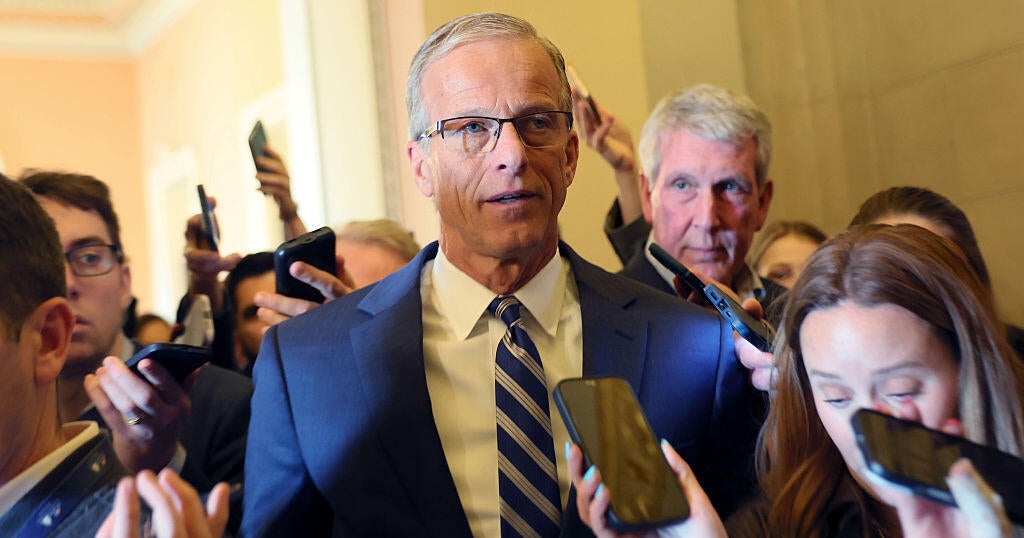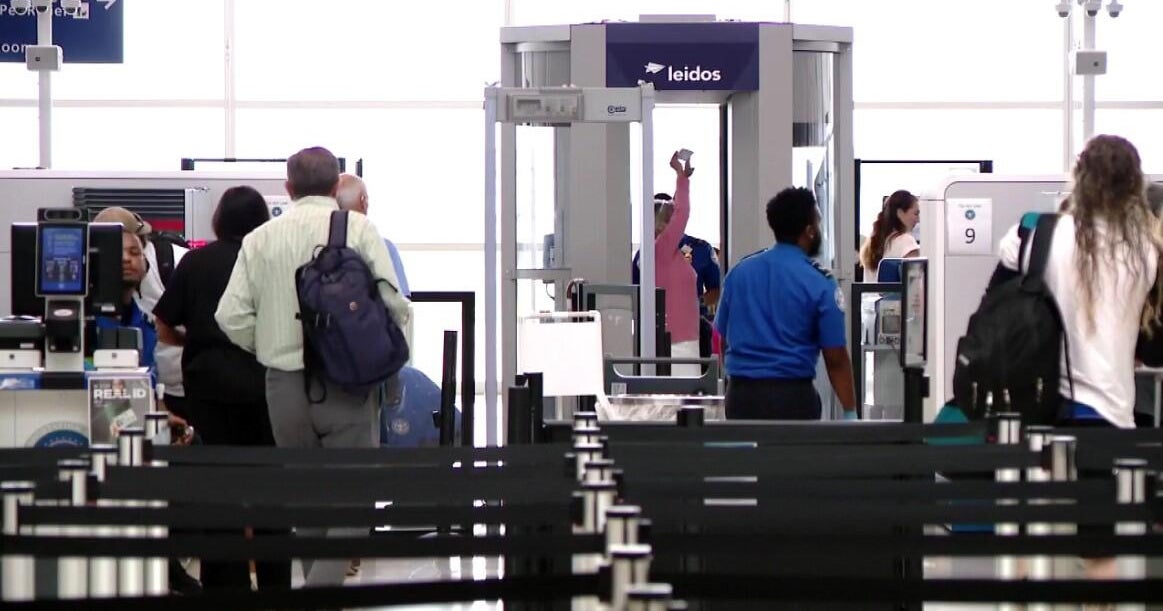Government shuts down on one-year anniversary of Trump presidency
A Senate attempt to move forward with a short-term spending bill vote failed Friday night, sending the government into a shutdown on the one-year anniversary of President Trump's inauguration. By the end of Saturday, things didn't look much more hopeful.
Friday night, Republican senators failed to capture the 60 votes they needed to even vote on the bill that would have funded the government for 30 days. Five Democrats voted with the Republicans to push a spending bill vote, and four Republicans voted with Democrats. The House passed the 30-day spending bill Thursday night. Debate over what to do next continued Saturday, with Sen. Majority Leader Mitch McConnell, R-Kentucky, saying he would be open to a three-week continuing resolution (CR), instead of a four-week one.
The Senate adjourned early Saturday and reconvened at noon. McConnell told senators they should expect votes on Saturday, "day one of the senate Democrats' government shutdown," as he described it Saturday. The House also reconvened.
"We do some crazy things in Washington, but this is utter madness," Speaker of the House Paul Ryan said on the House floor Saturday at noon.
The White House on Saturday indicated it would not negotiate on the Deferred Action for Childhood Arrivals (DACA) program while the government is shutdown, but Democrats want a fix on that immigration issue, putting the parties at a seeming impasse. There is nothing on the president's public schedule for Sunday.
- What to know about a government shutdown
- Capitol Hill negotiations continue amid government shutdown
Early Saturday, Sen. Jeff Flake, Republican of Arizona, told reporters after the vote that the Senate can't get a straight answer from Mr. Trump on where he stands on immigration. Flake voted against the short-term funding bill, putting him against McConnell.
"Because lets face it, we just can't get a straight answer from the White House," Flake said. "They're one place one day, and another place the next."
Flake and Republican Sen. Lindsey Graham, who also voted against the bill, said that they received a commitment from McConnell that he'll allow the Senate to take up an immigration reform bill if 60 Senators will commit to vote for it, regardless of how Mr. Trump feels about the bill.
After midnight, McConnell blamed Democrats for "the shoe-horning of illegal immigration into this debate." But Senate Democratic Leader Chuck Schumer, D-New York, said he even offered full funding for the border wall in an earlier meeting Friday with Mr. Trump.
"Even that was not enough to entice the president to finish the deal," said Schumer, who also noticed that a handful of Republicans voted with Democrats and blamed "discord" on the Republican side.
The White House called a lid shortly before 11 p.m. Friday, meaning the president will not be speaking — unless he tweets. White House press secretary Sarah Sanders blamed Democrats for the shutdown.
"Senate Democrats own the Schumer Shutdown," she said. "Tonight, they put politics above our national security, military families, vulnerable children, and our country's ability to serve all Americans. We will not negotiate the status of unlawful immigrants while Democrats hold our lawful citizens hostage over their reckless demands. This is the behavior of obstructionist losers, not legislators. When Democrats start paying our armed forces and first responders we will reopen negotiations on immigration reform. During this politically manufactured Schumer Shutdown, the president and his administration will fight for and protect the American people."
Vice President Mike Pence, on board Air Force Two on his way to the Middle East, issued this statement.
"Our administration worked in good faith to put a bipartisan deal on the table that would strengthen our borders, end chain migration, eliminate the visa lottery, and deal compassionately with DACA," Pence said. "But rather than solve problems, Democratic leadership preferred a shutdown that has dangerous consequences for our national defense. Their action tonight — or lack thereof — is unconscionable. Our administration will do everything within our power to support the brave men and women in uniform who stand on the front lines of freedom. But as of tonight, due to a completely avoidable government shutdown, they'll stand their post without pay."
On Capitol Hill Friday night, the scene was one of uncertainty and chaos.
Shortly before the 10 p.m. vote, Sen. John Cornyn, R-Texas, said there was "no deal" reached among Republicans to ensure passage. Sen. Lindsey Graham, R-South Carolina, announced he was a "no" on the 30-day deal, making a shutdown even more certain.
Sen. Richard Blumenthal, D-Connecticut, said blamed Mr. Trump, at least partially, for the failure to reach a deal. Blumenthal said that Senate Democratic Leader Chuck Schumer, D-New York, and Mr. Trump were close to reaching a comprehensive agreement earlier Friday, but the president walked away after talking to the hard right.
"It's one step forward with the White House, four steps back," said a senior Democratic Senate aide who noted it's unclear who among Republicans is in charge of negotiations. The White House is telling Democrats to negotiate with McConnell, who is still unclear what it exactly is that the president wants.
"It's like negotiating with Jell-O," the aide told CBS News' Nancy Cordes, adding, "the talks won't wrap up unless the president takes the reins."
Mr. Trump tweeted just before 9:30 p.m. Friday that it was "not looking good" and invoked the military and border security. He blamed Democrats, saying they "want a Shutdown in order to help diminish the great success of the Tax Cuts, and what they are doing for booming economy." It was the last statement he made before the government shut down.
Senate leadership and the White House were negotiating over two parallel issues — how long a government funding bill should last and what it should include, and what to include in a bill to protect DACA "Dreamers" and improve border security, a source told Cordes. The Senate Democratic Caucus met at 8:30 p.m. meeting to discuss strategy, while House Democrats scheduled a meeting for 10 a.m. on Saturday, suggesting they expected a shutdown before it happened.
On Friday night, White House legislative affairs director Marc Short said he still thought it was possible to reach a short-term spending deal Friday night, but that a deal on the Deferred Action for Childhood Arrivals (DACA) program is unlikely in the next 48 hours.
Late Friday afternoon, Office of Management and Budget Director Mick Mulvaney floated the possibility of weekend votes.
On Friday afternoon, Mr. Trump spoke with Ryan by phone, according to a source familiar with the communication.
Before that, Schumer went to the White House after an invitation from President Trump. The president, his chief of staff, John Kelly, and Schumer and his chief of staff met alone in the Oval Office, CBS News' Margaret Brennan reports, according to a White House official. Schumer told reporters afterward that progress had been made, but there was no deal.
Meanwhile, the executive branch Friday was releasing plans for a shutdown.
A senior White House official on a conference call Friday night said the president could still travel to Davos, Switzerland, on Air Force One in the event of the shutdown, because funding for such travel is at his discretion. Mr. Trump had been scheduled to leave Washington for Mar-a-Lago for the weekend on Friday, but the White House canceled his scheduled departure.
The Department of Health and Human Services (HHS) said it would extend the declaration of a public health emergency for the opioid crisis. The initial declaration was to expire on Wednesday.
Mulvaney sent a memo of frequently asked questions and answers regarding what to do in a shutdown to department and agency heads.
Environmental Protection Agency (EPA) chief Scott Pruitt issued a memo to employees stating the agency has enough funding for now, and directing employees to come into work next week, no matter what happens.
Capitol Lounge, a favorite spot for Capitol Hill staffers, began advertising drink specials starting at 12:01 a.m. Saturday, including, "To Flake or not to Flake," and "Have you ever met a Haitian?"
The House passed the bill, known as a continuing resolution (CR), in a 230-197 vote Thursday night. Afterward, Speaker Paul Ryan, R-Wisconsin, said he was urging Senate Minority Leader Chuck Schumer, D-New York, not to shut down the government.
"The only people standing in the way of keeping the government open are Senate Democrats," Ryan said Thursday night.
The CR includes a six-year reauthorization of the Children's Health Insurance Program (CHIP) and delays on three Obamacare taxes. Shortly before the vote, the House Freedom Caucus said a majority of its members had voted to approve the measure, making passage more certain.
This marks the fourth short-term spending bill Congress has had on its plate since September. Democrats, however, remain largely opposed to the measure because they want it tied to a larger immigration deal over the Deferred Action for Childhood Arrivals (DACA) program and border security.
The government last shut down in October 2013 for 16 days after Sen. Ted Cruz, R-Texas, led an unsuccessful effort to defund Obamacare. Republicans went on to retake control of the Senate in the 2014 midterm elections. It's unclear how a government shutdown would affect either party in this year's midterm elections in November.
CBS News' Rebecca Shabad, Kathryn Watson, Jacqueline Alemany and Rebecca Kaplan contributed to this report.



